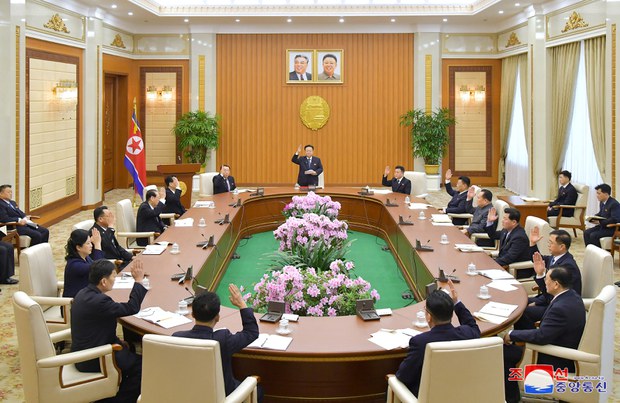N Korea ends all economic cooperation with South: state media
Share

The 30th plenary session of the 14th Standing Committee of North Korea’s Supreme People’s Assembly is held at Mansudae Hall in Pyongyang, North Korea, in this picture released by the Korean Central News Agency on Feb. 8, 2024.
Seoul is not considering reciprocal actions towards North Korea’s recent decision to annul all economic agreements with South Korea, as no swift impact on inter-Korean relations is expected, government sources in the South said.
North Korea’s state-run Korean Central News Agency reported on Thursday that Pyongyang has abolished laws on inter-Korean economic cooperation, including regulations on the special zone for international tours of Mount Kumgang and those for enforcing all agreements.
But an official at the South’s Ministry of Unification told local reporters on Thursday that “there are no ongoing inter-Korean cooperations anyway,” and therefore, “there are no imminent measures planned by [the South Korean] government,” Yonhap News Agency reported.
The North’s move was “expected,” said the official, adding that “it would only result in further isolation of Pyongyang.”
As of Thursday, a total of 258 agreements have been signed between the two Koreas, and Seoul sees 112 of them, including 28 joint press releases, as economic agreements, according to the unification ministry.
They include food loans, investment guarantees, inter-Korean commercial arbitration, railway and road connections, construction and operation of the Kaesong Industrial Complex, tourism in Mount Kumgang, inter-Korean fisheries cooperation, inter-Korean agricultural cooperation, inter-Korean shipping, cooperation in light industry and underground resource development, and cooperation in healthcare and environmental protection.
It is currently unclear which of these agreements have been scrapped, as North Korea has not made them public.
The move comes less than a month after Pyongyang decided to abolish agencies handling inter-Korean affairs, such as the National Committee for the Peaceful Reunification of the Fatherland, an agency in charge of national economic cooperation, and an agency handling the Mount Kumgang tour project.
The 2005 law on inter-Korean economic cooperation provides a basic framework for such collaboration, whereas the 2011 law concerning the special zone in Mount Kumgang outlines specifics regarding investments in the area by South Korean and international entities.
Edited by Elaine Chan and Mike Firn.







